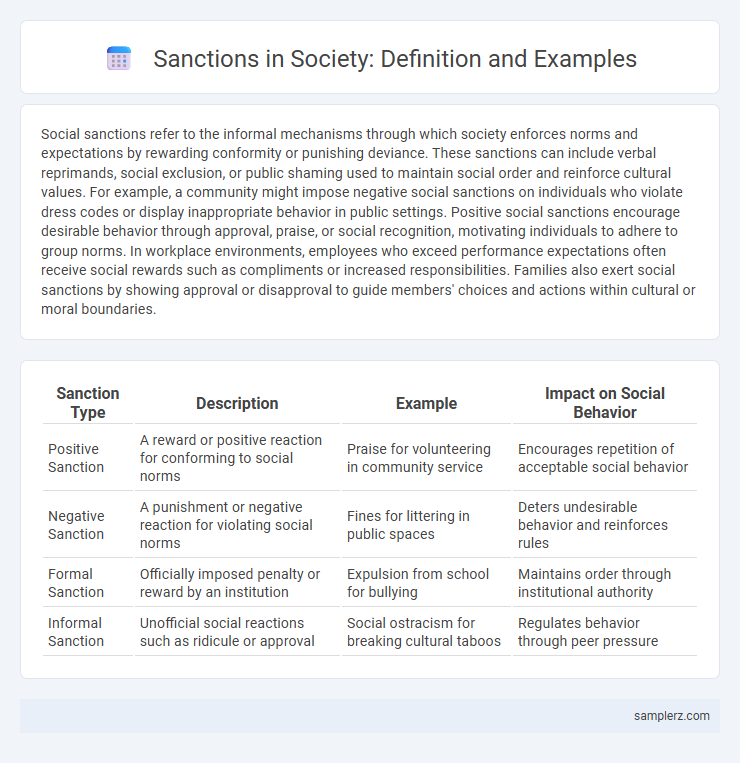Social sanctions refer to the informal mechanisms through which society enforces norms and expectations by rewarding conformity or punishing deviance. These sanctions can include verbal reprimands, social exclusion, or public shaming used to maintain social order and reinforce cultural values. For example, a community might impose negative social sanctions on individuals who violate dress codes or display inappropriate behavior in public settings. Positive social sanctions encourage desirable behavior through approval, praise, or social recognition, motivating individuals to adhere to group norms. In workplace environments, employees who exceed performance expectations often receive social rewards such as compliments or increased responsibilities. Families also exert social sanctions by showing approval or disapproval to guide members' choices and actions within cultural or moral boundaries.
Table of Comparison
| Sanction Type | Description | Example | Impact on Social Behavior |
|---|---|---|---|
| Positive Sanction | A reward or positive reaction for conforming to social norms | Praise for volunteering in community service | Encourages repetition of acceptable social behavior |
| Negative Sanction | A punishment or negative reaction for violating social norms | Fines for littering in public spaces | Deters undesirable behavior and reinforces rules |
| Formal Sanction | Officially imposed penalty or reward by an institution | Expulsion from school for bullying | Maintains order through institutional authority |
| Informal Sanction | Unofficial social reactions such as ridicule or approval | Social ostracism for breaking cultural taboos | Regulates behavior through peer pressure |
Understanding Social Sanctions: Key Concepts
Social sanctions include formal penalties like fines, suspensions, or legal actions imposed by institutions to enforce societal norms. Informal sanctions range from social disapproval, ostracism, or praise that regulate behavior within groups. Understanding these mechanisms highlights how societies maintain order and cohesion through reward and punishment systems.
Historical Examples of Social Sanctions
Historical examples of social sanctions include ostracism in ancient Athens, where citizens were temporarily exiled to maintain political stability. In medieval Europe, public shaming practices like the stocks and pillory enforced conformity by exposing individuals to community ridicule. Indigenous communities have also used social sanctions such as gossip and withdrawal of communal support to regulate behavior and uphold social norms.
Social Sanctions in Educational Settings
Social sanctions in educational settings often manifest as peer exclusion, teacher reprimands, or loss of privileges, which regulate student behavior and reinforce social norms. For example, students who violate dress codes or disrupt class may face detention or social isolation, signaling disapproval and encouraging conformity. These sanctions play a crucial role in maintaining order and promoting a positive learning environment by aligning individual actions with institutional expectations.
Community-Based Sanctions: Real-Life Cases
Community-based sanctions serve as effective alternatives to incarceration by promoting rehabilitation and social reintegration. In Norway, the use of community service and restorative justice programs has resulted in significantly lower recidivism rates, demonstrating the impact of such sanctions on reducing repeat offenses. Similarly, Brazil's community work orders have successfully engaged offenders in local development projects, fostering accountability and strengthening community ties.
Social Sanctions in Digital Communities
Social sanctions in digital communities include actions such as public shaming, account suspension, and content removal to enforce community guidelines and norms. Platforms like Twitter and Reddit employ these sanctions to curb harmful behaviors like hate speech, misinformation, and harassment. These measures promote respectful interactions and maintain safe online environments for diverse user groups.
Sanctions within Family Dynamics
Sanctions within family dynamics often manifest as expressions of approval or disapproval used to regulate member behavior, such as praise for academic achievements or reprimands for breaking household rules. These social sanctions reinforce norms and roles, maintaining family cohesion and discipline through rewards like verbal encouragement or punishments including loss of privileges. The impact of these sanctions shapes individual development and interpersonal relationships, highlighting the family's role as a primary socializing agent.
Religious Influences on Social Sanctions
Religious doctrines often shape social sanctions by promoting behaviors aligned with moral codes, such as community ostracism for violations like adultery or blasphemy. In many societies, religious leaders enforce social norms through rituals and public shaming, reinforcing adherence to sacred laws. These sanctions serve to maintain social cohesion by aligning individual actions with the collective ethical standards dictated by religious teachings.
Social Sanctions and Workplace Behavior
Social sanctions in the workplace include informal actions like peer pressure, exclusion, and public criticism to enforce norms and discourage undesirable behavior. For instance, employees who violate dress codes or show poor teamwork may face social ostracism or lack of collaboration from colleagues. These social sanctions complement formal disciplinary measures, promoting a cooperative and productive organizational culture.
The Role of Peer Pressure as a Social Sanction
Peer pressure functions as a powerful social sanction by encouraging conformity to group norms and deterring deviant behavior through social approval or disapproval. Individuals may experience exclusion, ridicule, or loss of status when failing to adhere to the expectations of their peer group, reinforcing adherence to accepted social standards. This informal sanction mechanism plays a crucial role in shaping behavior within various social contexts, such as schools, workplaces, and community settings.
Effectiveness of Social Sanctions in Shaping Behavior
Social sanctions, such as public approval or disapproval, effectively influence individual behavior by reinforcing societal norms and expectations. Positive sanctions like praise and recognition promote conformity and encourage desirable actions, while negative sanctions such as criticism or ostracism discourage deviant behavior. Research shows that consistent and culturally relevant social sanctions significantly contribute to maintaining social order and motivating compliance.

example of sanctions in social Infographic
 samplerz.com
samplerz.com